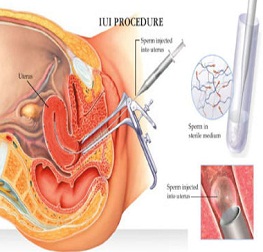- 9975035364
- [email protected]
IUI TREATMENT

What is IUI?
IUI is a fertility treatment that uses a catheter to place a number of washed sperm directly into the uterus. The goal of IUI is to increase the number of sperm that reach the fallopian tubes and subsequently increase the chance of fertilization.
When is IUI used?
IUI is a fertility treatment often selected by couples who have been trying to conceive for at least one year with no success. IUI may be selected as a fertility treatment with any of the following conditions:
- Unexplained infertility
- Low sperm count
- Decreased sperm mobility
- Requirement of donor sperm
- A hostile cervical condition, such as cervical mucus that is too thick
- Cervical scar tissue from past procedures or endometriosis
- Ejaculation dysfunction
IUI provides the sperm an advantage by giving it a head start, but still requires a sperm to reach and fertilize the egg on its own.

How does IUI work?
The IUI procedure is simple and may be performed even if the woman is not receiving medication to improve her egg production. Many physicians will encourage women to take medications to stimulate the ovaries to increase egg production in order to improve the chance of achieving pregnancy.
An ultrasound will be used to monitor the size of the follicles (follicles develop into eggs). The hormone, human Chorionic Gonadotropin (hCG), is administered to stimulate the release of eggs from the follicles.
An ultrasound will be used to monitor the size of the follicles (follicles develop into eggs). The hormone, human Chorionic Gonadotropin (hCG), is administered to stimulate the release of eggs from the follicles.
How successful is IUI?
Women under the age of 35 usually have higher rates of success than women over age 35, but the average success rate for IUI ranges from 10-20% in one cycle. With IUI, as with other methods of artificial insemination, the success rate depends primarily on the health of both the sperm and the woman.